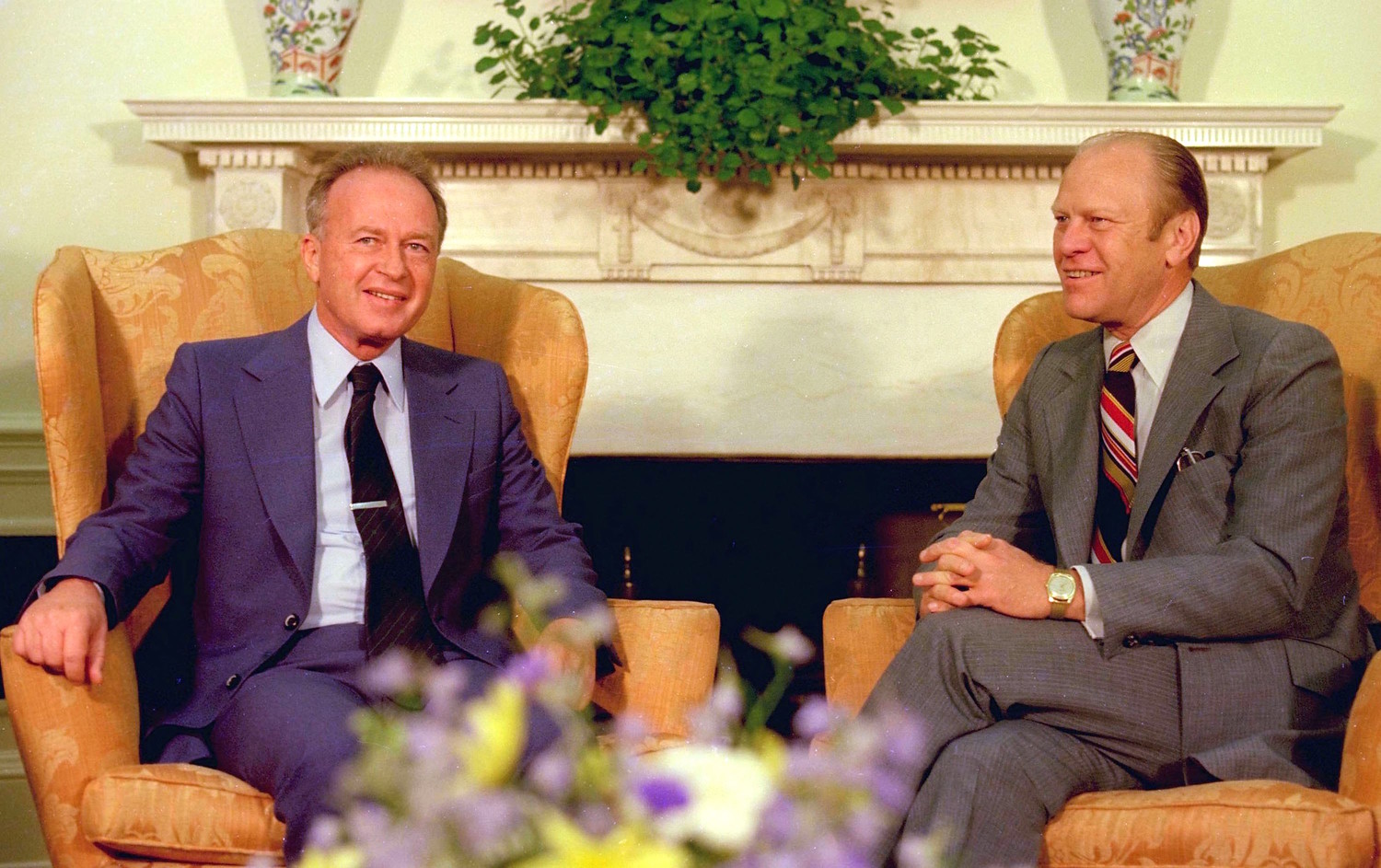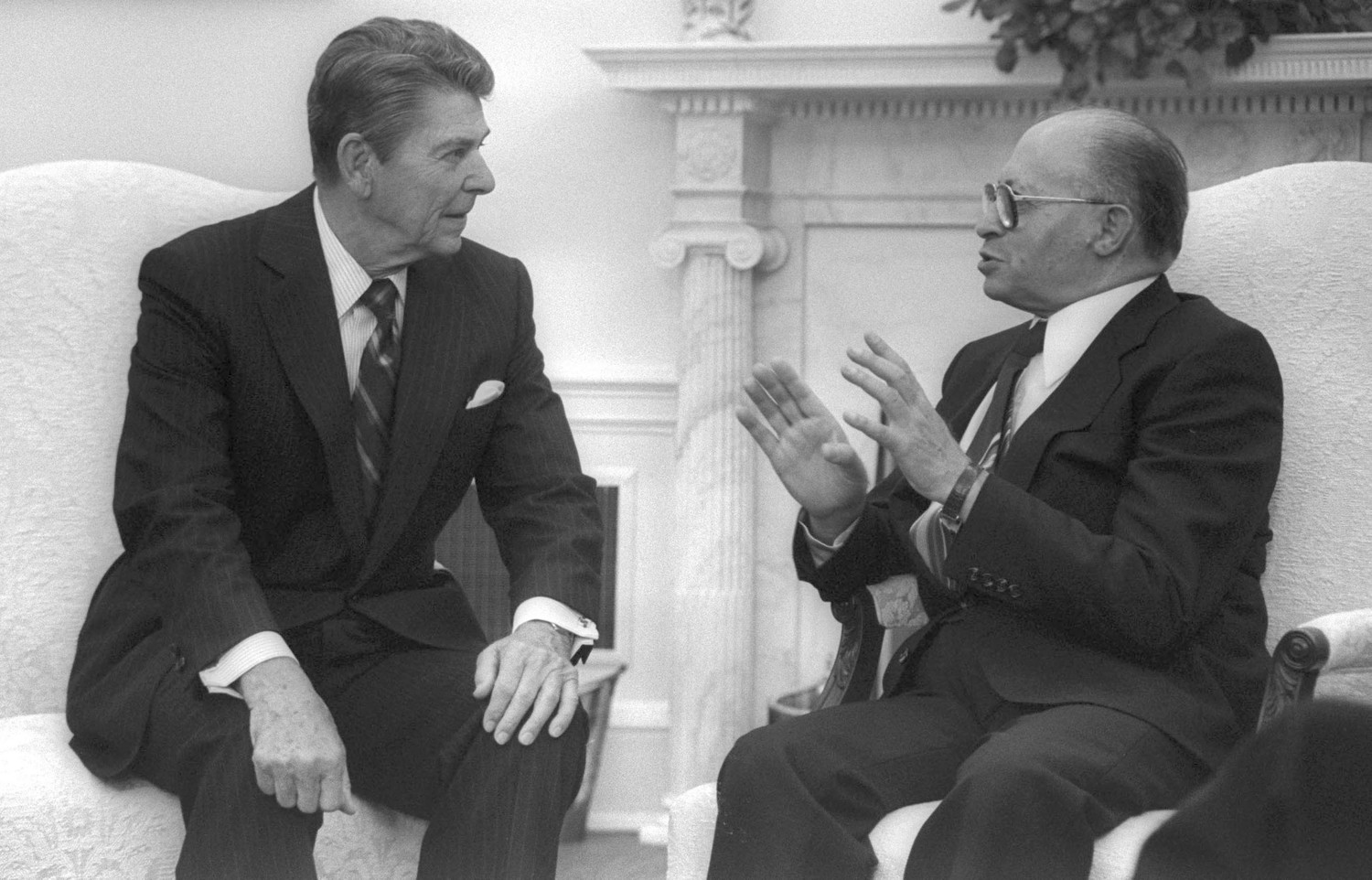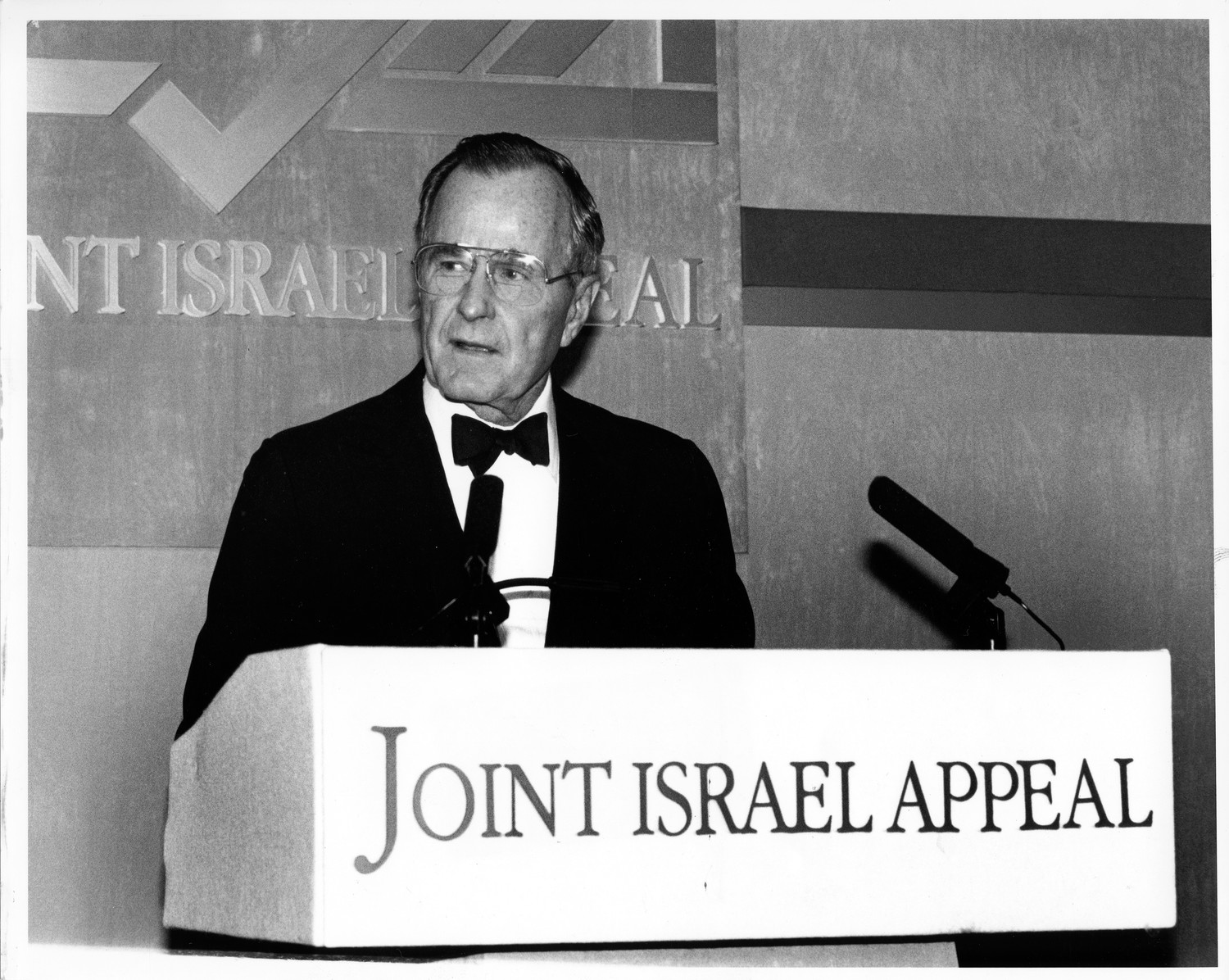Israel and White House through 13 presidents
JTA’s veteran Washington reporter Ron Kampeas describes the U.S.-Israel friendship through portraits of 13 of presidents, from Harry Truman to Donald Trump. This is part 2 of a 3-part series.
Gerald Ford: Backing Soviet Jews, and pressuring Israel to give back the Sinai
Gerald Ford, who succeeded Richard Nixon as president after Nixon’s resignation in 1974, was an anomaly: a president for less than a thousand days who had never been elected as president nor vice president. In 1973, he had replaced Vice President Spiro Agnew, who resigned.
Ford was president at a pivotal time. The movement to free Soviet Jewry in 1975 scored two critical victories: the passage of the Jackson-Vanik Amendment, which denied “most favored nation” trading status to countries with restrictive emigration policies, and the signing of the Helsinki Declaration, requiring the Soviet Union to respect human rights, including freedom of religion.
Ford was the right executive at the right time. An early backer of the movement to free Soviet Jews, he was Republican minority leader in the U.S. House of Representatives in 1971 when he spoke at a Madison Square Garden rally for Soviet Jewry.
“His administration’s signing of the Helsinki accords, which established a clear link between international relations and human rights, was the most important step in the struggle to win the Cold War,” former prisoner of conscience Natan Sharansky told JTA when Ford died in 2006.
Ford inherited Nixon’s secretary of state, Henry Kissinger, who grew frustrated with what he perceived as Israeli intransigence in talks with Egypt. Kissinger wanted Yitzhak Rabin to pull back from a portion of the Sinai Peninsula captured from Egypt in the Six-Day War. In March 1975, Kissinger said that the Ford administration was “reassessing” U.S. Middle East policy, including assistance to Israel.
Ford said he was “profoundly disappointed” in Israel’s reluctance to cooperate. He put a hold on critical arms sales for six months, but could not face down congressional pressure to relent. The pro-Israel lobby garnered 76 signatures on a Senate letter to Ford “to be responsive to Israel’s urgent military and economic needs.”
Jimmy Carter: Unpopular force behind
the Camp David Accords
Jimmy Carter, the Democratic governor of Georgia, defeated Ford to become president in 1976. The devoutly Christian farmer was the only figure at the 1978 Camp David peace talks who was unflaggingly committed to the outcome.
Anwar Sadat, the Egyptian president, was unsure how much he could sacrifice while maintaining his leadership in the Arab world. Israeli Prime Minister Menachem Begin emerged from a political strain that did not give up land for anything. Aides to all three advised them to save face, cut losses and give up.
Carter was the engine of the talks that brought a peace to Israel’s southern flank that has lasted until today, even through rule by the Muslim Brotherhood. For nearly two weeks, he kept the Israeli and Egyptian leaders at Camp David, shuttling between their cabins to work out each nuance.
Carter’s was also a human rights presidency: he made the implementation of the Helsinki Declaration, requiring the Soviet Union to respect human rights, a hallmark of his presidency; spoke out on behalf of Natan Sharansky; and launched the U.S. Holocaust Memorial Museum in Washington.
To the pro-Israel lobby, the flip side of Carter’s doggedness was arrogance. Carter was the first president to unequivocally declare Israel’s settlements in captured lands to be illegal. He launched secret contacts with the Palestine Liberation Organization. And he forged ahead with plans to sell Saudi Arabia F-15 combat aircraft. In 1980, he became the first Democratic presidential nominee since 1924 not to garner a majority of Jewish voters. (He won a plurality, but lost the election.)
Carter remains a popular former president, but with American Jews, his relationship has become more fraught. In a 2006 book, he predicted that Israel was on a path to apartheid if it did not advance toward peace with the Palestinians. He met with leaders of the Hamas terrorist group.
“He is flawed, he’s got an obsession with Israel, a biased obsession that borders on anti-Semitism,” Abraham Foxman, then director of the Anti-Defamation League, said in 2012.
Those present at Camp David say Carter, who as governor of Georgia visited Israel and was outspoken on behalf of Soviet Jews, should be remembered for making peace.
“You could argue with positions that President Carter took over the years on this or that aspect,” said Elyakim Rubinstein, a member of the Israeli delegation to Camp David, “but what he did then was the combination of his being an engineer and a religious man, believing religiously in peace and in the bettering of human life.”
Ronald Reagan: Cold warrior who cared
— and sold spy planes to the Saudis
When Ronald Reagan cowed the Soviet Union into winding down the Cold War — his successor, George H.W. Bush, formally ended it — a key component of his animus toward Moscow was its treatment of Jews.
“He was someone who was truly committed to overturning the Communist system and gaining freedom for all people, but he had a particularly soft spot in his heart for Soviet Jewry,” Mark Levin, a longtime advocate for Soviet and Eurasian Jewry, told JTA in 2004, when Reagan died.
When Theodore Mann, the chairman of the National Conference on Soviet Jewry, returned from a visit to the Soviet Union in 1981, the first call he received was from Reagan, wanting to know all about the trip.
On Reagan’s watch, in 1986, the Soviets released Natan Sharansky, who had spent nine years in Soviet prisons. Reagan’s ties to the pro-Israel community extended back to his Hollywood days. As California governor in 1967, he headlined a pro-Israel rally at the Hollywood Bowl.
Reagan won over the wary with his avuncular affect.
“This man cared,” Shoshana Cardin, who led a number of Jewish organizations, once said of Reagan, but his persuasive powers could also be a sharp-edged weapon.
In 1981, AIPAC lobbied hard against a proposed sale of AWACS spy plans to Saudi Arabia. Reagan met Jewish senators one-on-one and threatened to unleash dual-loyalty charges if they voted against him.
“It is not the business of other nations to make American foreign policy,” the president said. In 1981, the administration joined a U.N. Security Council resolution condemning Israel’s bombing of Iraq’s nuclear reactor.
After Israel’s Christian allies in Lebanon massacred Palestinians in 1982, Reagan sent U.S. troops into Lebanon — against advice from Israel.
He and Israeli Prime Minister Menachem Begin exchanged barbs, and Begin famously chided him for treating Israel like a “banana republic.” Reagan secretly planned to surprise Begin with a peace plan that would have pulled Israel out of the West Bank and Gaza Strip. Under pressure from Reagan, Israel allowed PLO leader Yasser Arafat to leave Lebanon.
On Reagan’s watch, authorities arrested Jonathan Pollard, a civilian Navy analyst who was a spy for Israel. Israeli figures were caught up in Reagan’s efforts to trade arms to Iran for the release of U.S. hostages in Beirut. In his final months in office, a lame duck beyond political pressures, Reagan established ties with the Palestine Liberation Organization.
To the chagrin of even his allies, in 1985 Reagan visited Germany’s Bitburg cemetery, where 40 members of the Nazi Waffen SS were buried.
“It is precisely because you have so impressed us in the past with your deep understanding of the need to keep the meaning and memory of the Holocaust alive that we have been so keenly disturbed by your plans,” Elie Wiesel said in a telegram to Reagan.
George H. W. Bush: The patrician advocate for Jews in distress and the Madrid peace talks
George H.W. Bush had been involved in advocacy for Soviet Jewry since his days as ambassador to the United Nations under Nixon. As Reagan’s vice president, his responsibilities included efforts to free Jews in distress — not only in the former Soviet Union, but in Ethiopia and in Syria as well.
Bush quarterbacked Secretary of State George Schultz’s confrontation with the Soviets over Russia’s captive Jews and was instrumental in persuading Syrian dictator Hafez Assad to allow young Jewish women to immigrate to the U.S. so they could marry. As president, he gave the nod to the Marxist Mengistu regime in Ethiopia that led to Operation Solomon, the mass airlift to Israel in 1991.
Following his success in the 1991 Gulf War, Bush convened the multilateral Arab-Israeli peace conference in Madrid. It was marked by tensions with Israeli Prime Minister Yitzhak Shamir, but in retrospect, Bush was as tough on the Arab interlocutors, and just the fact that Saudi Arabia, Gulf states and North African countries sat at the table with Israel led to Israeli diplomatic inroads.
Pro-Israel activists will never forget — or forgive — Bush’s comment that he was “one lonely guy” facing off against “thousands of lobbyists on the Hill,” referring to AIPAC, which pushed back against his pledge to suspend loan guarantees to Israel unless it froze settlement building. The patrician Bush couldn’t get away with tough-guy talk, and instead sounded self-pitying and mildly anti-Semitic.
His chief of staff, James Baker, didn’t help things when he reportedly dismissed the prospect of Jewish protestations by saying, essentially (but much more crassly), “They don’t vote for us anyway.”
After Saddam Hussein invaded Kuwait in 1990, the Iraqi strongman pelted Israel with missiles. Israel itched to respond, but Bush insisted that Israel take it on the chin so he could assemble a broad coalition to oust Iraqi forces from Kuwait. Israel complied, and its leaders were stunned when in the war’s aftermath, Bush used American actions to protect Israel during the war as leverage to get Israel to Madrid. It was galling, because Israel had been reluctant to accept the assistance in the first place.

 48.0°,
Light Rain
48.0°,
Light Rain 









